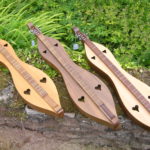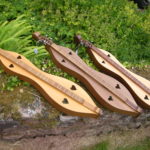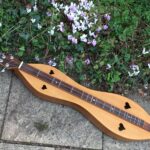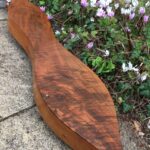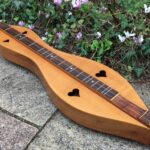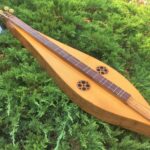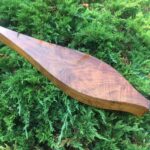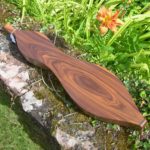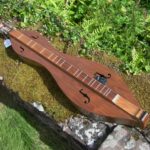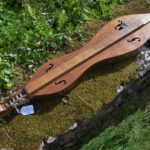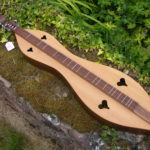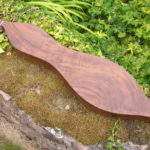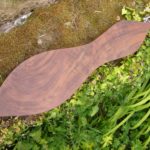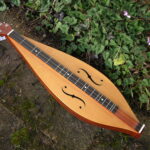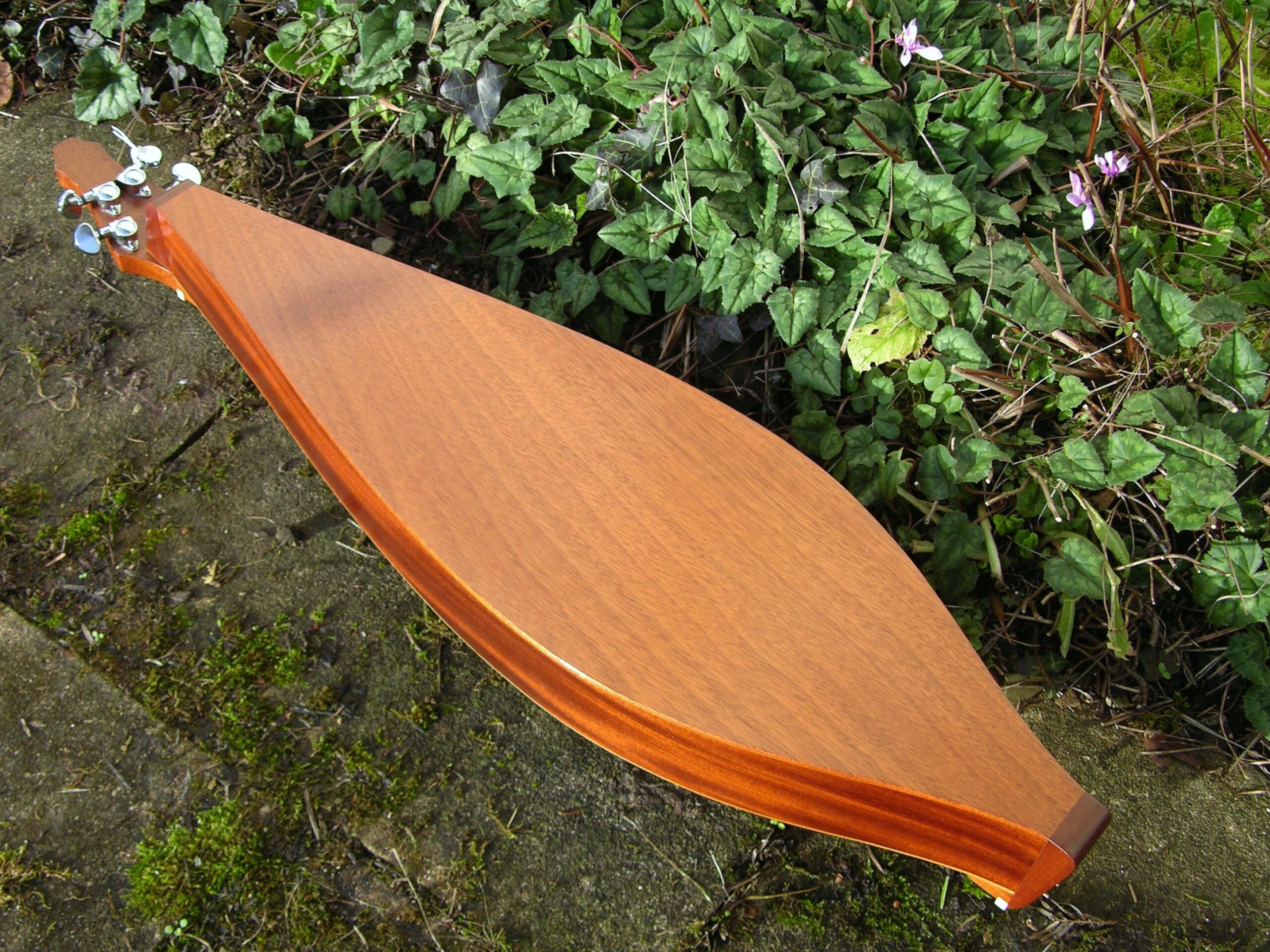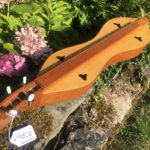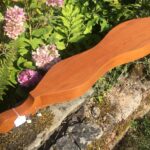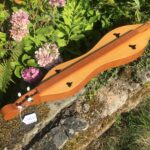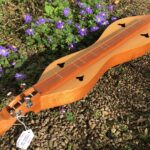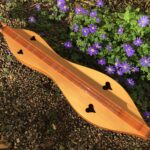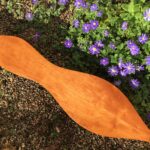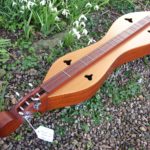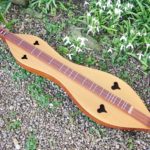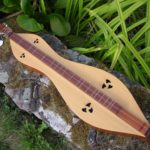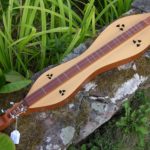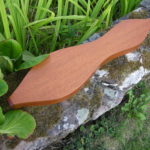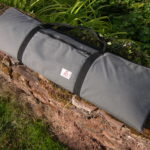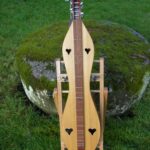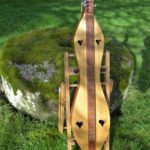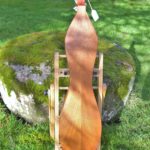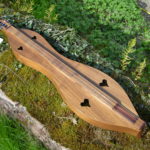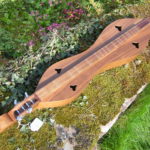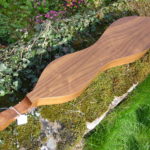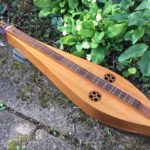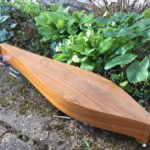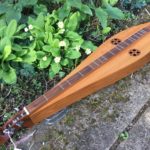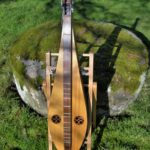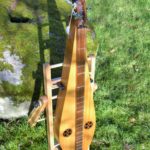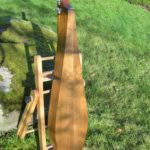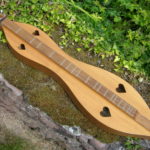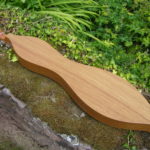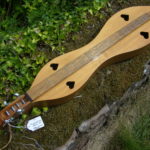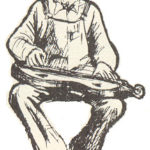FolkRoots Dulcimers
The Folk Roots design goes back to 1969 when two brothers, Howard (a Capricorn) and Michael (a Taurus) Rugg formed CapriTaurus dulcimers in Felton, California. Michael was the dulcimer player and administrator, Howard the maker. Their main model was a big bodied, long scale dulcimer with plenty of power, yet also surprisingly well balanced from treble to bass. In 1973, they were joined by Stephen Jackel and the new partnership began to make their popular laminated wood dulcimers under the FolkRoots name. In 1976, Michael Rugg departed, leaving Rugg and Jackel (and their fellow workers) to turn out thousands of dulcimers. In 1979, the Rugg and Jackel company started making solid wood instruments – the D100, D550 etc. In 1989, the business was sold to Folkcraft who continued to sell their bigger bodied dulcimers under the FolkRoots label – now also called the D series. During the period 1969 – 1989, Howard estimated that they made between 18,000 and 20,000 dulcimers.
Folk Roots Family: pictures below show (l to r) a 1970s D40S, 1980s D50 and 1980s D550S
The D550 and D550S have the classic large D body, designed by Howard Rugg and based on his Capritaurus dulcimers, made in California from the late 60s onwards. The D550ST is the premium model of the classic D50T teardrop design. The D500 appears to be a premium walnut-bodied instrument, with the S suffix, as usual, denoting a spruce top. The solid wood range began in 1979 and these are the top of the range model, made from solid Californian Walnut or Walnut with a Spruce top.
2.227 1984 D-500 S #049 4 String 3 Course Hourglass £Sold
Later almost square FolkRoots label with sunflower-shaped central logo comprising 8 dulcimers: “FolkRoots Dulcimers/ Rugg and Jackel Music Company/ made in the United States of America”/ D-500 S 049 [h/w]”. Howard Rugg’s workplace log has its construction as 3-22-84 (22nd March 1984).
This is the classic large-bodied late 60s Capritaurus design, taken to its ultimate. Beautiful highly-figured Californian walnut single piece back with walnut bookmatched sides boasting an unusual and complex range of brown, yellow and orange colours. Small wooden feet on back (one missing). Spruce top with heart soundholes, pointing to the tail. Narrow, elegant flat headstock fitted with chunky and very smooth-acting Grover enclosed tuners. Rosewood overlay on headstock and hollow fingerboard, the body of the latter being made of the same multi-hued walnut as the sides. Mother of pearl markers at frets 3, 7, 10, 14. Older, narrow-style frets, with beginnings of wear on the melody string side. 6+ fret has been added at some stage in the past – a slightly different gauge. Bone nut and bridge, the latter altered by a recent owner to add some compensation for playing in DAD tuning. Unusual (for FolkRoots) through-tail string guides, the strings being anchored in a recess with no pins – hence suitable for ball-end strings only. Overall length 36½”, upper bout 5⅝”, lower bout 7¾”, depth 2½”, FBW 1½”, VSL 29⅛” (long scale), weight 1071g (2lb 6oz). Strings now 0.012/[0.012], 0.016, 0.024w . Added 6+ fret (no 13+).
A very handsome – and rare – high-end FolkRoots dulcimer from the West Coast Golden Age of the early 1980s. The length of scale gives it higher string tension, resulting in great balance and good projection – a very poised, full sound. The action is low and the rosewood fingerboard a delight, so fretting is easy despite the scale length. It shows evidence of two repairs, one to the headstock and one to a crack on the nearest side. Both have been discretely and permanently completed and should cause no further problems.
Click on images below to enlarge.
2.226 1985 D550ST #094 4 String 3 Course Teardrop £Sold
Later almost square FolkRoots label with flower-shaped central logo comprising 8 dulcimers: “FolkRoots Dulcimers/ Rugg and Jackel Music Company/ Made in the United States of America”. Unexpectedly, no handwritten model and serial numbers. Howard Rugg confirms that an unlabelled model D550ST (which this is) was made on 5-17-85 with serial #094.
Deep body with bookmatched walnut sides and gorgeous figured single-piece Californian walnut back. The top is straight-, but not particularly fine-grained spruce. The headstock is also probably walnut, but with unusual yellow and orange figuring. Shallow pegbox opening, fitted with open-geared tuners and white buttons. Hollow (?) walnut fingerboard with darker, highly figured overlay, probably the same Californian walnut as the back. Curly maple infill in strum hollow. Usual hardwood nut and bridge; 6+ but not 13+ fret. The soundholes are the usual walnut rosettes, comprising a pattern of 4 big and 5 smaller holes, as in the less elaborate, contemporary D50ST models. Overall length 36½”, upper bout n/a, lower bout 7½”, depth 2½”, FBW 1⅜”, VSL 29¼” (long scale), weight 1010g (2lb 4oz). Strings now 0.011/[0.011], 0.014, 0.023w . Original 6½ fret (no 13+).
A relatively light and very lively body with good sustain, good balance and warmth. Plenty of mid and bass tones, without being in the least over-powering. Excellent intonation and plays right up to the second octave. Good low action. Slight overtone on bass A? A few dings on the edges but generally very good condition after nearly 40 years.
Click on images below to enlarge.
The original owner sent the following letter: “I wanted to fill you in on the history of “Miss Ellie” as I called my favorite dulcimer. I have owned a few others but she has always been number one. She has a deeper tone than most, which I came to love and played her extensively.
I bought her brand new at McCabe’s Guitar Shop in Los Angeles, California. I played Elizabethan music with two other women in Pasadena, CA for some years before heading to Saudi Arabia, where she and I resided and played together with other needy musicians for a few more years. She helped me through some difficult times there. I will always be grateful.
I mainly played Randy Wilkinson’s tablature [his arrangements of Elizabethan music] and I have included some tattered pages that I played off……The only reason I am parting with Miss Ellie is I have a condition in my hands that no longer allows me to play. So, it is with a heavy heart that I am letting her go. But I have always felt instruments needed to be played and enjoyed, not something to be hung on the wall. I often found her staring at me with sadness so I am sure she will be happier now (oh the things we project!). I myself will miss her terribly.
I only used Danish oil on her surface. There is a mark on her top where I always kept the heel of my palm where I fingerpicked my music. That should polish out. I never strummed her or used a pick so there are no pick markings. I played with three strings, which is very traditional, but she will hold four….
It is my fervent hope that “Ellie” brings you all the joy and peace and sheer fun that she gave to me for all those years.”
2.138 2006 Folk Roots D550 4 String Hourglass £Sold
Printed label: “Handcrafted by:/FOLKROOTS DULCIMERS [logo]/ Winsted CT 06098/ Model: D550 – 189 [h/w]/ Date: 8-9-2006.”
One of the last produced in Winsted before Folkcraft/FolkRoots was bought out and moved to Indiana in 2007.
All solid walnut with single piece back, nicely-figured bookmatched top, sides and probably fingerboard (although it is lighter and seems unsealed). Small f-hole soundholes in both UB and LB. No dot markers with 6+ but no 13+ fret. Good quality chrome open-geared tuners with two-hole shanks. Ebony nut and bridge.
Overall length 37”, upper bout 5¾”, lower bout 7¾”, depth 2½”, FBW 1½”, VSL 29¼” (long scale), weight 2lb 7oz (1123g), strings now 12, 15, 25w as current FolkRoots instruments. Has 6+, no 13+ fret.
Fitted with a passive “Shadow” pickup, mounted beside the fingerboard, with a ⅛” output and two rotary controls. Excellent condition with some minor abrasion on far-side top. A clear, loud tone and plenty of volume – as you would expect from a large, deep body.
2.163 c1985 Folk Roots D550S #110 4 String Hourglass £Sold
Later square printed label – “Folk Roots Dulcimers/ Rugg & Jackel Music Company/ Made in the United States of America/ [h/w] D550S 110”.
Large body made of spectacular Californian walnut, with bookmatched sides and one piece figured back, decent quality spruce top. Figured walnut pegbox/scroll and tail cap, walnut fingerboard with darker mahogany (?) overlay. Copper pin string anchors for ball and loop end strings. Open-geared chrome tuners. Usual rosewood (?) nut and bridge. Originally no 6+ fret, now fitted.
Overall length 36¾”, upper bout 5¾”, lower bout 7¾”, height 2½”, FBW 1½”, VSL 29¼” (long scale), weight 2lb 2oz (971g), strings originally 0.009/0.009, 0.013, 0.026w now 0.011/[0.011], 0.014, 0.024w. New 6½ fret.
Produces a lovely full sound with attractive tone, good balance and plenty of volume – and punch if required. Good intonation. Immaculate and exciting for a 30+ year old instrument.
The Model D100S is the classic large D body made from solid Honduras mahogany with a spruce top, designed by Howard Rugg and based on his Capritaurus dulcimers, made in California from the late 60s onwards. The Model D300S is similar, but made of solid cherry, sometimes with a bookmatched back. Rare examples of a D400S exist. The one pictured is a special order short-scale dulcimer with a flat head and other luxury trimmings.
2.301 (Ex-2.205) 1987 FolkRoots D400STs #115 £Sold
Square label with circular design, “Rugg and Jackel Music Company/ Folk Roots Dulcimers/ Made in the United States of America/ D-400 STs 115 [h/w]” Howard Rugg, founder and chief builder at Rugg and Jackel, has confirmed the build date as 12 June 1987 and that it was a special order. D= dulcimer; 400 = solid mahogany; S = spruce top; T = teardrop; S = short scale.
Short, deep body made from solid mahogany (not bookmatched on the back) with some attractive stripey sides and a spruce top with skeletal f-holes. Hollow, mahogany fingerboard with lovely ebony overlay, mother of pearl markers at frets 3, 7, 10, 14. 6+ but no 13+ fret. Neat, tulip-shaped flat head with heavy, chromed Grover enclosed tuners. Bone nut and bridge (very near the tail), the latter compensated for DAD (?). Simple copper pins on the tail act as string anchors. Overall length 33¼”, upper bout n/a, lower bout 7¾”, height 2½”, FBW 1½”, VSL 26″ (medium scale), weight 2lb 1oz (935g), strings now 0.011/0.011, 0.012, 0.021w. [check – looks like original strings]
Light construction with limited internal bracing make for a lively instrument with a lively back in particular. Loud but not boomy. Interestingly, the volume when playing on the lower frets seems rather greater than the middle frets on all strings. Note the main body dimensions (depth, lower bout, fingerboard width) are identical to the hourglass D series solid wood dulcimers of the period – except for the much shorter scale length. A well-crafted, pretty and good-sounding curiosity.
Click on images below to enlarge.
2.285 198? D300-S #201 4 String 3 Course Hourglass £365 + £25 original shell case in good condition
Later almost square FolkRoots label with star(or sunflower)-shaped central logo comprising 8 dulcimers: “FolkRoots Dulcimers/ Rugg and Jackel Music Company/ made in the United States of America”/ D300-S #201 [h/w]”
This is a solid wood, premium version of the classic Capritaurus/FolkRoots big-bodied West Coast dulcimer, designed to approach the sound and volume of a guitar. The D300 has a cherry body with the ‘S’ designation indicating a solid spruce top. The back is not bookmatched but has an interesting cherry grain pattern: the top is very evenly grained spruce with typical FolkRoots heart soundholes. The headstock and hollow fingerboard are also cherry, the former with a scroll and narrow pegbox, the latter with a 6+ but not 13+ fret. The tuners are open-geared with white buttons. The nut and bridge appear to be rosewood, the latter without compensation. The string anchors are copper pins, on which both loop- and ball-end strings can be used. Overall length 36½”, upper bout 5¾”, lower bout 7¾”, depth 2½”, FBW 1½”, VSL 29¼” (long scale), weight 963g (2lb 2oz). Strings now 0.011/[0.011], 0.014, 0.023w . 6+ but not 13+ frets.
Great tone, as always, with some volume if required. Pretty accurate intonation towards the second octave. Long scale length but easy to move about. Needed some re-hydrating when arrived, but now looks sleek and generally in excellent condition, with just a few nicks on the far side top edge. NB Could be converted very successfully as a baritone dulcimer (at small extra cost). Original shell case in good condition.
Click on images below to enlarge.
2.274 198? D300-S #030 4 String 3 Course Hourglass £Sold
Later almost square FolkRoots label with sunflower-shaped central logo comprising 8 dulcimers: “FolkRoots Dulcimers/ Rugg and Jackel Music Company/ made in the United States of America”/ D300-S 030 [h/w]”. Howard Rugg’s workplace log has its construction as [TBA].
This is one of the low volume, solid wood dulcimers put out in the early to mid-1980s, as opposed to the more mass market laminate D40s and D50s. The basic body design is the same, derived from the 1960s/1970s big volume Capritaurus hourglass, but this is made from carefully chosen solid cherry, bookmatched on the back and straight-grained on the sides. It has a narrow-grained solid spruce top. The usual FolkRoots shallow scroll and pegbox is also cherry, fitted with chrome, two-capstan tuners. Cherry fingerboard with 6+ and 13+ frets fitted – if a later addition, well-matched; heart-shaped soundholes; no markers. Copper pin string anchors for loop- and ball-end strings. Cherry tail cap, which has opened a small but stable gap at the bottom. Overall length 36½”, upper bout 5¾”, lower bout 7¾”, depth 2½”, FBW 1½”, VSL 29¼” (long scale), weight 871g (1lb 15oz). Strings now 0.010/[0.010], 0.014, 0.024w . 6+ and 13+ frets.
Sounds full and loud, even with lightish strings. Clear tone with good balance. A light, responsive body with full 2½ octave fingerboard. A fine example of Californian lutherie, quite a rare model, and in excellent condition for a 40 year old dulcimer.
Click on images below to enlarge.
2.212 Early 1980s (?) D100S #289 4 String 3 Course Hourglass £Sold
Label reads: “Rugg and Jackel Music Company/ Made in the United States of America/ Folk Roots Dulcimers/ [h/w] D100 s 289.”
Bookmatched solid mahogany back and sides with fine-grained spruce top, traditional Folk Roots heart soundholes, pointing to tail. Narrow mahogany fingerboard with added 6+ and 13+ frets (correctly positioned and not obtrusive, but heavily dressed). Rosewood nut and bridge, latter right on the tail, and copper pin string anchors. Shallow, closed pegbox with decent open-geared tuners and metal buttons; low “scroll”. Overall length 36¼”, upper bout 5¾”, lower bout 7⅞”, height 2½”, FBW 1½”, VSL 29¼” (long scale), weight 2lb 1oz (950g), strings now 12/[12], 14, 23w. 6+ and 13+ frets.
As so often with these big FolkRoots solid wood models, a lovely mellow, balanced sound matched to good playability, notwithstanding the long scale. Action is easy but set at just about the minimum possible. Good condition for age.
Click on images below to enlarge.
2.169 2002 Folk Roots D100S Hourglass £Sold
Oblong printed label: “Handcrafted by:/ [small round logo] FolkRoots Dulcimers/ Winsted, CT 06098/ Model D100S [h/w]/ Date 4-22-2002”
Standard 29¼” VSL big D hourglass body. Solid mahogany single-piece back and bookmatched sides, with bookmatched solid spruce top. “Circle of Hearts” soundhole design, 6+ but not 13+ frets, ebony nut and bridge. Standard Folk Roots mahogany scroll and pegbox with chrome open-geared tuners (twin hole capstan). Copper pin strings anchors for loop or ball end strings.
Overall length 36”, upper bout 5⅝”, lower bout 7¾”, depth 2½”, FBW 1⅜”, VSL 29¼” (long scale), weight 1lb 15oz (895g), strings now 10, 14, 22w. Has 6+, no 13+ fret.
Plays well, bright with plenty of dynamics as befits a big, light body. Good condition but not pristine – a few dings on the edges. An excellent intermediate/advanced instrument.
2.127 1979/1980 D 100S #036 £Sold inc. shell case (slightly scuffed)
Printed label “Rugg and Jackel Music Company/ Folk Roots Dulcimers/ Made in the United States of America/ D100S 036 [h/w]”. The serial number dates it to the very first years of solid wood dulcimer production, either late 1979 or early 1980.
Solid mahogany, fully bookmatched, sides and back with mahogany (hollow) fingerboard, pegbox and scroll. Mahogany endblock with copper pins for string anchors. Rosewood (?) nut and bridge with 6+ but not 13+ frets. Good quality open-geared chrome tuners with a double-hole capstan.
Overall length 36¾”, upper bout 5¾”, lower bout 6⅞”, height 2½”, FBW 1½”, VSL 29¼” (long scale), weight 2lb 1oz (940g), strings now 10, 14, 23w. 6½ fret, no 13+.
A classic design, neat, simple and unshowy, and well constructed from good materials. Has excellent projection with a clean, balanced sound and pretty good intonation. Pristine condition for such an early instrument.
The D50 model is the big-bodied walnut laminate model, sometimes with a solid spruce top (D50S).
1.94 1980 FolkRoots D50 Hourglass 4 String 3 Course Sold
Later square label with round logo comprising fan of dulcimers in daisy shape: “Folk Roots Dulcimers/ Rugg and Jackel Music Company/ Made in the United States of America/ [h/w] D50 [#]129803 [3rd dulcimer made on 9th December 1980]”.
This is the big, laminated walnut bodied model. Usual walnut scroll and shallow, routed pegbox with decent chrome open-geared tuners. Usual FR heart design for soundholes, tails pointing to tail. Walnut fingerboard with, unusually, a shallow overlay of a harder, fine-grained wood. Rosewood nut and bridge. Copper pins for string anchors.
Overall length 36½”, upper bout 5¾”, lower bout 7¾”, depth 2½”, FBW 1⅜”, VSL 29⅛” (long scale), weight 1039g (2lb 5oz). Strings now 0.012/[0.012], 0.015, 0.025w . Original 6½ fret (no 13+).
Nice, full sound from long scale and medium weight strings. Good condition, just a little light superficial rippling in the walnut back and top.
The D50ST is a large bodied teardrop with a walnut laminate body and solid spruce top, with neat walnut rosettes, made from the 1970s through to the mid-1980s.
2.214 1980 FolkRoots D50ST £Sold
Later square label with round logo comprising fan of dulcimers in daisy shape: “FolkRoots Dulcimers/ Rugg and Jackel Music Company/ Made in the United States of America/ [h/w] D50 ST/ [h/w] 1119804 [4th dulcimer made on 19th November 1980]”.
Big-bodied teardrop with a solid spruce top, walnut inlaid soundholes (pattern of holes) and good quality walnut laminate body – looks almost like a bookmatched back. Walnut closed pegbox and scroll with quality chrome open-geared tuners with two-hole capstans. Walnut hollow fingerboard, oddly with darker walnut overlay. What seems to be original 6+ fret (no 13+). Neat bone nut and bridge, possibly replacements, cut originally only for 4 equidistant string set-up, now offering option of conventional 4 string/double melody. Four copper pin string anchors. Overall length 36¼”, lower bout 7⅝”, depth 2½”, FBW 1⅜”, VSL 29⅛” (long scale), weight 1008g (2lb 4oz). Strings now 0.011/[0.011], 0.014, 0.022w . 6+, no 13+ fret.
Considering this bore the label of the South Shore [Boston, Mass.] Folk Music Club Instrument Loan Program, it is in good condition, though a few frets had sprung and needed re-levelling. It has a highish action and a longish scale, but plays easily with huge sustain, good intonation and good balance.
Click on images below to enlarge.
1.86 1978 Folk Roots D50ST Teardrop 4 String 3 Course £Sold inc. original (rather tired) case
Elaborately printed label with older man in hat and dungarees playing dulcimer (“Cappy Dick”): “Folk Roots Mountain Dulcimer/ Made in U.S.A. by Rugg and Jackel/ [h/w] D50ST [#]66783 [3rd dulcimer made on 6th June 1978]”. Body is bookmatched (!) laminated walnut with a solid spruce top. Rich walnut D50 style scroll pegbox with 4 decent quality open-geared tuners. Hollow pale walnut (?) fingerboard with shallow, darker walnut overlay. Originally no 6+ or 13+ frets. Chunky rosewood (?) bridge and nut. Neat dark walnut soundhole inserts with a concentric pattern of different size holes. Walnut tailblock with four copper pins/string anchors in a diagonal array. Overall length 36½”, lower bout 7¾”, depth 2½”, FBW 1½”, VSL 29⅛” (long scale), weight 1023g (2lb 4oz). Strings now 0.012/[0.012], 0.016, 0.025w . 6½ fret now fitted.
In remarkable original condition. Chip on bridge (now repaired) and 6+ fret added. Action on the high side, but excellent tone and volume from a remarkable survivor. Fitted original shell case in brown included (solid structurally, but outer material has puckered on top).
Click on images to enlarge.
The D40 is the mahogany laminate model, sometimes with a solid spruce top (D40S).
1.96 1974 Folk Roots D40S Hourglass 4 String £Sold
Square printed label with “Cappy Dick” illustration. “Folk Roots Mountain Dulcimers/ Made in U.S.A. …. By RR&J/ [h/w] Model D40S #118744 [8th November 1974, fourth built that day]”.
Laminated golden “mahogany” body with solid, non-bookmatched spruce top. Solid mahogany pegbox, scroll and tail cap. Mahogany fingerboard, routed underneath with rosewood (?) nut and bridge, no 6+ fret originally (now fitted), slightly inset bass string layout. Plain copper (?) pins as string anchors for ball and loop end strings. Decent quality open-geared chrome tuners, set in shallow pegbox opening. NB Slightly different dimensions to the later FolkRoots models and a different-shaped heart to the classic later soundhole. Overall length 36⅜”, upper bout 5½”, lower bout 7¾”, depth 2½”, FBW 1½”, VSL 29¼” (long scale), weight 1lb 15 oz (901g), strings now 11, 14, 22w.
Light, bright sound with good volume. Probably constructed and set up for DAA playing, but intonation good in DAD, the outer strings just fading slightly below pitch into 2nd octave. Lower action than D50 1.94 though perhaps not quite so balanced a tone.

